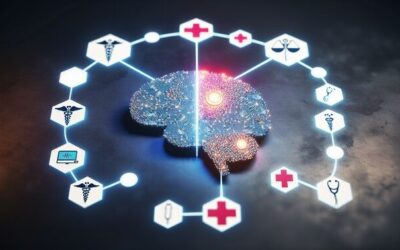Introduction to AI in Healthcare
Artificial Intelligence (AI) is revolutionizing healthcare by enhancing both clinical and operational outcomes. At its core, AI refers to computer systems designed to perform tasks traditionally requiring human intelligence, such as understanding natural language, recognizing patterns, and making decisions. Key types of AI in healthcare include machine learning (ML), which enables systems to learn from data and improve over time, and natural language processing (NLP), which allows for the interpretation and manipulation of human language.
AI has been impactful particularly in diagnostics. Algorithms can analyze medical data, identify patterns, and assist in diagnosing diseases earlier and more accurately than traditional methods. For example, AI has shown promise in fields like radiology, detecting abnormalities in medical imaging faster than human radiologists. A study highlighted that AI could match or even exceed human experts in diagnosing certain conditions, such as cancers from imaging studies [Source: Nature].
Operationally, AI enhances efficiency in healthcare settings by automating routine tasks, optimizing scheduling, and managing supply chains. AI-driven tools can streamline administrative processes, allowing healthcare professionals to focus more on patient care. The integration of AI systems in healthcare facilities has been shown to reduce costs and improve service delivery [Source: Farmonaut].
Current Applications of AI in Healthcare
AI applications in healthcare are diverse and impactful. One of the most significant areas is in diagnostic tools. AI algorithms are increasingly being integrated into diagnostic applications, improving accuracy and speed. For instance, AI-powered radiology tools, such as those developed by Zebra Medical Vision, are capable of examining medical images for early indications of conditions like fractures or tumors. These systems can interpret images at a rate and accuracy that often surpasses human radiologists, leading to quicker diagnoses and treatment [Source: Zebra Medical Vision].
Moreover, AI is enhancing predictive analytics, enabling healthcare providers to anticipate patient needs and outcomes. Health systems use machine learning to analyze vast amounts of patient data to predict hospital readmission risks. For example, the Mount Sinai Health System’s predictive analytics program has successfully reduced readmission rates by 20% [Source: Mount Sinai]. Furthermore, AI is being utilized to forecast disease outbreaks, helping public health officials implement timely interventions based on predictive models that analyze social media data and historical trends [Source: Health Affairs].
Emerging Trends in AI and Healthcare
Advancements in AI are profoundly reshaping healthcare, introducing innovative trends that enhance patient care. One notable trend is the use of natural language processing (NLP) to manage and interpret patient data. By utilizing NLP, clinicians can extract meaningful insights from unstructured data in electronic health records, significantly improving workflows and patient engagement. Studies indicate that NLP applications streamline clinical documentation, allowing caregivers to focus more on interactions with patients [Source: NCBI].
AI is also a game changer in chronic disease management, offering tools for continuous monitoring and early intervention. Smart wearables and mobile apps integrated with AI algorithms can track patient vitals, predict exacerbations, and alert caregivers. This capability is particularly vital in managing conditions such as diabetes and hypertension, where timely adjustments can significantly improve quality of life [Source: NCBI].
Telemedicine has also been enhanced by AI, making healthcare more accessible. AI-driven platforms allow for real-time consultations and remote monitoring of patients, broadening access to care, especially in rural and underserved communities. By mitigating barriers imposed by physical distance, these technologies enhance the efficiency of healthcare delivery [Source: SAGE Journals].
Challenges and Considerations in AI Adoption
The integration of AI into healthcare systems presents several vital challenges. These can be broadly categorized into ethical, regulatory, and operational issues that need addressing for successful AI deployment.
Ethical Concerns
Data privacy is a pressing challenge. Given the sensitive nature of health information, strict adherence to regulations such as HIPAA in the United States is essential, mandating the protection of patient data. Unauthorized access or data breaches can have severe repercussions, underscoring the need for robust security measures in AI systems [Source: HealthIT.gov].
Algorithmic Bias
Another significant hurdle is bias in AI algorithms. Machine learning models can inadvertently reflect or amplify biases present in training data, leading to skewed outcomes. For instance, research has shown that AI predictive tools often perform poorly for underrepresented populations, raising concerns about equity in healthcare access [Source: Nature]. Rigorous testing and validation across diverse demographic groups are necessary to ensure algorithms do not perpetuate inequality.
Regulatory Frameworks
The rapidly evolving nature of AI technology often outpaces existing regulatory frameworks, creating uncertainty for healthcare providers. Clear guidelines are necessary for the ethical deployment of AI tools, requiring collaboration among stakeholders—including regulatory bodies, healthcare institutions, and technology developers—to create policies that safeguard public interest while promoting innovation.
Equitable Access
Ensuring equitable access to AI technologies is paramount. Disparities in technology adoption can exacerbate health inequities, particularly in underserved communities. By prioritizing inclusivity in AI deployment strategies, stakeholders can work toward a more equitable distribution of healthcare resources, allowing all populations to benefit from technological advancements [Source: Farmonaut].
In essence, addressing these challenges is crucial for the ethical, equitable, and effective integration of AI in healthcare, ultimately leading to improved patient outcomes and enhanced system efficiencies.
Sources
- Atomwise – AI in Drug Discovery
- Farmonaut – Top 5 Agriculture Management System Software Solutions 2025
- Health Affairs – Predictive Analytics in Healthcare
- HealthIT.gov – Health Data Privacy and Security
- NCBI – Natural Language Processing Applications in Healthcare
- NCBI – AI in Chronic Disease Management
- SAGE Journals – AI and Telemedicine
- Zebra Medical Vision – AI in Radiology
- Mount Sinai – Predictive Analytics Program
- Nature – Bias in AI Algorithms




